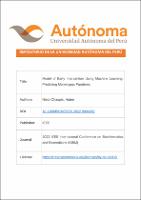| dc.contributor.author | Nieto-Chaupis, Huber | |
| dc.date.accessioned | 2023-10-04T16:41:16Z | |
| dc.date.available | 2023-10-04T16:41:16Z | |
| dc.date.issued | 2022 | |
| dc.identifier.uri | https://hdl.handle.net/20.500.13067/2653 | |
| dc.description.abstract | This paper presents a model of intervention at the first phases of global pandemic using the criteria of Mitchell that simplifies to some extent the philosophy of Machine Learning. These criteria are projected onto the convolution integrals whose purpose is the systematization of the inputs functions. The integer-order Bessel functions are employed as learning functions. Special attention is paid on the ongoing pandemics of Covid-19 and particularly the recent Monkeypox. Simulations of the main variables of pandemic such as the recovered, actives cases and new infections are presented. From the built theory, the evolution of Monkeypox has been predicted for a period of 300 days of pandemic. | es_PE |
| dc.format | application/pdf | es_PE |
| dc.language.iso | eng | es_PE |
| dc.publisher | IEEE | es_PE |
| dc.rights | info:eu-repo/semantics/restrictedAccess | es_PE |
| dc.rights.uri | https://creativecommons.org/licenses/by-nc-nd/4.0/ | es_PE |
| dc.subject | COVID-19 | es_PE |
| dc.subject | Philosophical considerations | es_PE |
| dc.subject | Pandemics | es_PE |
| dc.subject | Convolutional | es_PE |
| dc.subject | Optimized production technology | es_PE |
| dc.subject | Machine learning | es_PE |
| dc.subject | Predictive models | es_PE |
| dc.title | Model of Early Intervention Using Machine Learning: Predicting Monkeypox Pandemic | es_PE |
| dc.type | info:eu-repo/semantics/article | es_PE |
| dc.identifier.journal | 2022 IEEE International Conference on Bioinformatics and Biomedicine (BIBM) | es_PE |
| dc.identifier.doi | https://doi.org/10.1109/BIBM55620.2022.9994982 | |
| dc.subject.ocde | https://purl.org/pe-repo/ocde/ford#2.02.04 | es_PE |


